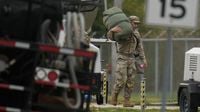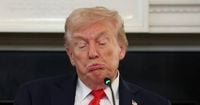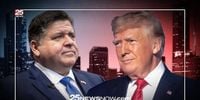The clash between President Donald Trump and Illinois Governor JB Pritzker reached a fever pitch this week, as the White House’s aggressive efforts to deploy military forces to Democratic-led cities—including Chicago—sparked a fierce war of words, legal battles, and deepening political fault lines. The controversy, which has been simmering for weeks, erupted into public view when Trump posted on social media Wednesday that both Pritzker and Chicago Mayor Brandon Johnson "should be in jail" for failing to protect Immigration and Customs Enforcement (ICE) officers. The accusation was just the latest salvo in a broader dispute over federal authority, states’ rights, and the future of American democracy.
Governor Pritzker did not mince words in his response. In a Wednesday TV interview, he taunted the president, saying, “Come and get me,” and later wrote on social media, “Trump is now calling for the arrest of elected representatives checking his power. What else is left on the path to full-blown authoritarianism?” According to Capitol News Illinois, Pritzker doubled down outside the federal courthouse in Chicago, labeling Trump “unhinged” and a “wannabe dictator.” In a dramatic moment, Pritzker looked directly into the camera and declared, “If you come for my people, you come through me.” He then added, “so come and get me,” even extending his hands as if ready to be cuffed.
Mayor Brandon Johnson, for his part, invoked the nation’s troubled racial history, stating, “This is not the first time Trump has tried to have a Black man unjustly arrested,” before reaffirming, “I’m not going anywhere.” These pointed remarks underscored the deeply personal and political nature of the dispute, which has quickly become a flashpoint in the ongoing national debate about presidential power and civil liberties.
The immediate catalyst for this confrontation was Trump’s decision to deploy Texas National Guard troops to Illinois, stationing them at a U.S. Army Reserve training facility in Elwood, near Joliet. This move, made over the vocal objections of state and local officials, was justified by the Trump administration as necessary to protect ICE officers and facilities in the wake of what they described as escalating threats and unrest. However, Illinois Attorney General Kwame Raoul argued that the deployment violated the state’s sovereign rights and the 1878 Posse Comitatus Act, which generally prohibits the military from participating in domestic law enforcement.
Legal challenges quickly followed. U.S. District Judge April Perry on Monday declined to grant Illinois’s request for a temporary restraining order to block the National Guard deployment, but scheduled further hearings for Thursday, October 9, and Friday, October 10, to consider the matter in more detail. As reported by Capitol News Illinois, this legal uncertainty has left both sides in a tense standoff, with neither willing to concede ground.
Against this backdrop, President Trump has repeatedly floated the possibility of invoking the Insurrection Act of 1807—a rarely used statute that grants presidents sweeping authority to deploy federal troops on U.S. soil to suppress “rebellion” or “unlawful obstructions.” Trump told reporters Monday, “If I had to enact it, I’d do it, if people were being killed and courts were holding us up, or governors or mayors were holding us up.” According to NBC News, the administration has held “increasingly serious discussions” about invoking the Act, though sources suggest such a move is not imminent and would likely come only after other legal avenues have been exhausted.
The Insurrection Act has a complicated history. While it has been invoked around 30 times, its use without a state governor’s request is exceedingly rare—the last such instance occurred during the Civil Rights movement of the 1960s. The law permits the president to override the restrictions of the Posse Comitatus Act, allowing the military to perform law enforcement actions, including arrests and crowd control, typically reserved for civilian agencies. Legal scholars, such as Joseph Nunn of the Brennan Center, have noted that while the president’s discretion under the Act is broad, it is not unlimited. “There is no circumstance in which the President can deploy the military into a city and a state like New York or Chicago and direct the military to enforce state and local law,” Nunn told Forbes.
Courts have generally given presidents wide latitude under the Insurrection Act, but they retain the right to intervene if the law is invoked in bad faith or if troops are used in a way that clearly violates the law. As the Supreme Court wrote in a 1932 ruling, “What are the allowable limits of military discretion, and whether or not they have been overstepped in a particular case, are judicial questions.” This legal ambiguity has left both the Trump administration and its critics on uncertain ground, with each side preparing for a possible showdown in the courts.
The political stakes are enormous. Pritzker has accused Trump of targeting “blue cities in blue states” in an effort to normalize the presence of federal troops on American streets ahead of the 2026 elections. He speculated that Trump’s ultimate goal might be to “guard” polling places and “intimidate a lot of people who are not Republicans.” The Illinois Board of Elections has already refused to hand over sensitive voter data to the federal government, with Pritzker warning, “They haven’t told us why, but we know what they’re looking for is an excuse to say that there is fraud in the election in 2026. That is the real purpose.”
The broader context is a presidency increasingly defined by confrontation with Democratic-led cities. Earlier this year, Trump sent National Guard troops into Los Angeles and Washington, D.C., before announcing plans to deploy the military to Oregon and Illinois. After a federal judge blocked the deployment of troops to Portland, Trump successfully sent Texas National Guard members to Chicago, despite fierce opposition. Throughout, the president has insisted that these moves are necessary to restore law and order, stating in August, “I’m going to make our cities very, very safe.” According to NBC News, Trump reportedly regretted not invoking the Insurrection Act during his first term amid the racial justice protests following the murder of George Floyd, which may now make him more inclined to use the law in his second term.
Meanwhile, political leaders are grappling with the implications. At a panel in Minneapolis on October 7, Pritzker and Minnesota Governor Tim Walz joked about who might be arrested first, with Pritzker raising his hand and quipping, “Come visit me in the gulag in El Salvador.” The humor belied a deep anxiety about the future of American democracy and the potential for further escalation.
As the courts prepare to weigh in and the rhetoric intensifies, the nation finds itself at a crossroads. The outcome of this standoff could reshape the balance of power between Washington and the states, and set precedents with far-reaching consequences for civil liberties and the rule of law.



